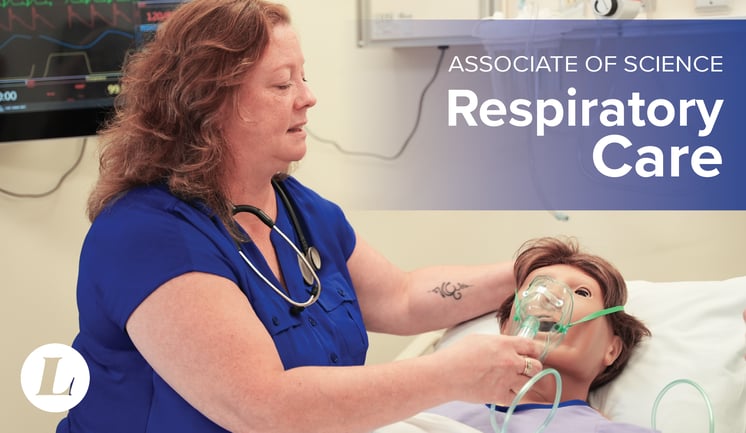Respiratory Care Careers
Is a respiratory care career for you? Explore the role of respiratory therapists, educational requirements, job outlook, and more. Contact Labouré for program details.
Respiratory therapists help people breathe easier.
Breathing is as essential to life as a heartbeat. These two mechanisms work in tandem to distribute life-giving oxygen throughout the body. But what happens when disease damages the lungs? Breathing becomes more difficult. The body struggles.
If you’re looking for a healthcare profession that helps people live better lives, consider becoming a respiratory therapist.
This article will help you understand what respiratory therapists do, why they are in demand, and the career opportunities that are available. If you’re curious about what respiratory therapists earn and how you can become one, keep reading as we explore why respiratory therapy is a great career choice.
Respiratory therapists (RTs) are healthcare workers who assist healthcare providers in diagnosing and treating patients with lung or airway problems. RTs work with healthcare providers to develop treatment plans, monitor patients, administer breathing treatments, manage ventilators and other oxygen delivery systems, and educate patients about their breathing disorders.
RTs once worked mainly in hospitals. Today, respiratory therapists work in all areas of healthcare, from home health to medical offices and community health centers to medical centers. Much of the demand for respiratory therapists is due to an aging population and increased rates of lung diseases.
People in the U.S. live longer than ever before. They also live long enough to develop health problems, including chronic lung diseases. Between 1990 and 2017, chronic lung disease rates increased by almost 40%, according to the journal Respiratory Research. Chronic lung diseases include asthma, chronic obstructive pulmonary disease, chronic bronchitis, congestive heart failure, and emphysema.
Then in 2019, the COVID-19 virus spread throughout the world. People with chronic lung conditions are more likely to be hospitalized or die from the virus than those without lung problems.
And while COVID cases have decreased, many people, even young people, still live with lingering symptoms, including breathing problems.
Today, more than ever, respiratory therapists can make a lasting impact on the lives of people with lung disease.
While respiratory therapists usually start their careers in hospitals, many branch out to find work in other locations, such as home health, medical offices, sleep clinics, nursing homes, and community health centers. Experienced therapists may move into supervisory positions or specialize.
For example, a respiratory therapist in a hospital newborn intensive care unit may decide to specialize in neonatal and pediatric respiratory care and earn a Neonatal/Pediatric Respiratory care credential.
A specialty credential shows employers that you are committed to providing your patients the highest level of respiratory care. Credentialing involves a minimum level of experience, a nationally recognized exam, and continuing education credits to assure that the therapist's knowledge is current.
There are five clinical areas in which you can choose to pursue a specialty credential:
Where your career takes you will also depend on your level of education. Stacking a bachelor's degree onto an associate degree can increase your earning potential and open the door to other career paths, such as management.
RTs with advanced degrees can also find jobs in research, product development, or teaching.
By 2033, the Association of American Medical Colleges expects the U.S. will experience a severe shortage of medical specialist physicians, such as lung doctors. As a result, the American Association for Respiratory Care (AARC) is promoting a career path for RTs who want to practice at an even higher level.
The Commission on Accreditation for Respiratory Care (CoARC) has developed standards and scope of practice for a new respiratory therapy role, the advanced practice respiratory therapist (APRT). APRTs are required to have a master’s degree in respiratory therapy and will practice at a level similar to a nurse practitioner.
Currently, the only program available in the U.S. that prepares RTs to practice at this advanced level is the Master of Respiratory Therapy Program at Ohio State University.
The U.S. Bureau of Labor Statistics reports that the median annual salary for respiratory therapists in 2021 was almost $62,000.
As RTs gain more education and move into higher-level positions, their pay rates will rise. As of 2021, the top 10% of respiratory therapists earned more than $95,540 annually.
The demand for RTs is driving an impressive number of open jobs. The U.S. Bureau of Labor Statistics reports that the number of jobs for respiratory therapists is predicted to grow by 14% over the next 8 years. That’s 9% higher than the expected job growth for all professions combined.
Now that you know what a respiratory therapist does, what a career in respiratory therapy might look like, and the average respiratory therapist salary, you might be asking what you need to do to become a respiratory therapist.
You can get started in the rewarding field of respiratory therapy with a two-year associate of science (AS) degree. Earning an AS degree, such as the one offered by Labouré College of Healthcare, is a great way to enter the workforce and start earning an income without having to spend four years in college.
Applying for admission to a respiratory care associate degree program requires a high school diploma or the equivalent. Applicants may need to supply a minimum GPA or GED/HiSET score. In addition, programs may request that you take a skills or admission test, such as the ATI Test of Essential Academic Skills, and earn minimum scores on each section.
Some programs, like Labouré’s, require prerequisite science and math courses. But what if you haven’t taken the required classes during high school or college? At Labouré, you can complete the Pre-Health Professions Pathway as part of the Associate of Science in Health Science program to help you meet the admissions requirements for the respiratory care associate degree program.
The second education option to become a respiratory therapist is to earn a bachelor's degree. Similar to what’s required for an associate degree program, you’ll need to have a high school diploma to get into college. There may also be other requirements for admission, like a minimum GPA and prerequisite science and math classes.
If you aren’t able to spend four years in college before earning an income, getting an associate degree and gaining some experience can be a great early career move before tackling that bachelor’s program.
Degrees and GPAs aren’t the only criteria that admission staff consider when deciding who to admit to their respiratory therapy program.
Getting into an RT school can be competitive. If you think you want to be a respiratory therapist, now is the time to begin evaluating your high school and college course choices, buckling down to get better grades, and getting to know people in the respiratory care field.
Let’s dive deeper into what you can do to stand out from the crowd.
The admissions counselor can help you determine your game plan for creating a strong application while spending time with a student and a working respiratory therapist can help you get your questions answered and decide if respiratory therapy is the right career path for you.
Learn more about how earning an Associate of Science in Respiratory Care from Labouré College of Healthcare can set you on your way to a rewarding career as an in-demand respiratory therapist.
Ready to get started?

Is a respiratory care career for you? Explore the role of respiratory therapists, educational requirements, job outlook, and more. Contact Labouré for program details.

Respiratory therapists and nurses are both in high demand. Which career is right for you? Learn more about both professions in this article.

Labouré is excited to announce the launch of its Associate of Science in Respiratory Care! Students began their clinical classes in Fall 2023.
© 2024 Labouré College of Healthcare. All Rights Reserved.
Comments